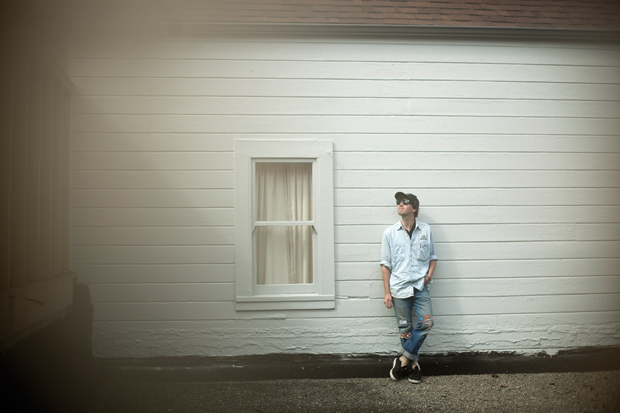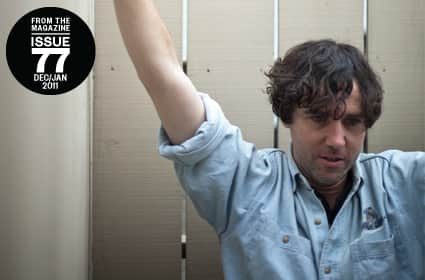Cass McCombs is riding high on a dark horse.
Death is an LA hippie with sandy Jesus hair and an Eagle Rock area code. Usually he makes you wait, but tonight, at the Gaylord Apartments in Koreatown, he is right on time. In a knock, shuffle and a handshake, his deal is done and Liza Thorn, a raggedy glam waif, sees him out. She sits alone in leopard silk and fishnets, fingering the paper scrap where she’s jotted his phone number under the all-caps header, GRIM REAPER. Years of bleach have turned her mop into more of a glamorous white-blonde broom with bangs, and for the moment she tops six feet on wobbly heels. In the reaper’s wake, she vacantly watches with faded blue eyes, as the sun puts the Hollywood hills to bed in pink and orange blankets out her kitchen window. The Velvet Underground’s “Beginning To See The Light” plays so loud that the bass rattles in her spaced out teeth. Vaguely amused with herself, she asks the other room, “Does Friday night even exist?” Nobody answers.
Beyond her kitchen door, beneath the banner of an eight-foot American flag lies Cass McCombs, conked out on the couch. He is three-some months off a world tour supporting Wit’s End, a devastating study of other people’s pain, and by the looks of him, he’s still recovering. The floor is strewn with witchcraft candles, topless Polaroids and lyrics like, I don’t believe in God/ Drugs make me feel nothing, sharpied and discarded in girly half-cursive on computer paper. At 34, McCombs has spent half his life on the road, keeping the occasional apartment, but mostly living out of his car, stashing Star Wars toys, Phish bootlegs and other odd collections in a storage locker. He is no stranger to scenes like the one in Thorn’s apartment, but he’s been in Los Angeles long enough to have exhausted most of his crash options. In five days, he’ll beat it up to Big Sur before dragging out to New York where he hasn’t asked any favors in a while. What likely started as a cheap trick to keep the responsible world at bay has become a long-term dodge, allegedly kept up for the sake of collecting song material. “I think the gods reward a free-spirited attitude,” he says. “If you make time for the spirits, they make time for you.”
McCombs moves about the country, from town to town, collecting stories and staying open. It can make for a sore back and a sorer backdrop, but he claims not to like “nice” places anyway, or even nice people. “I like to read and work and visit my friends,” he says, “And that’s enough.” He romanticizes border towns in song and seems to feel most comfortable among outsiders. At one point, he half seriously cites homeless drug addicts as “the only people I like in Seattle.” Having a taste for the nameless is perhaps how he has managed to get six-and-a-half records into a pretty big time 10-year career without settling on a genre or becoming especially famous. He’s been lo-fi, country, Brit pop, rock and even a soul man. John Peel, who famously knew what he was talking about, called McCombs “unobtrusively brilliant.” McCombs still lives in his car. This is an incredible achievement.

Old friend Ariel Rechtshaid, who produced McCombs’ records Wit’s End and Humor Risk as well as 2009’s Catacombs, has carried him through several of those musical incarnations. Currently, he’s also putting him up in the guest room of his Echo Park home several nights a week. Far from the chaos of Thorn’s dishabille, Rechtshaid’s house is deep, USA-blue and relaxing to look at. Opposite the porch, skinny pine trees march in rows under haphazard, cloud-grazing palm stalks. Rows of white and tan houses are stacked crooked into a hill, painting a portrait so dead-on California, that even the stupid Accord across the street looks like it was parked there for a reason. All September an Asian pear tree has been dumping browning yellow fruit across his lawn and you can hear the bees going crazy for it over McCombs’ guitar, as he picks out the measured, bendy blues of Elizabeth Cotten’s “Freight Train.” Barefoot in the kitchen, he’s wearing last night’s jeans and a breeze rolls in through the open door carrying outside smells. “I don’t understand why anybody would want to write about me,” he muses. “I’m not interesting. I’m the writer. I tell the stories. The story is not about me.” Though not exactly anti-press, McCombs can only recall three sit-down interviews in the past 10 years. It’s not the reporters so much as the self-degradation they inspire that has soured him on the process. “If you want to do something exceptional,” he says, “something individual, unique and rare, it’s just impossible if you’re going to the committee. It can only inhibit the songs.”
Spending time with McCombs conjures an endless high school weekend, dappled with aimless walks, stoney drop-ins, odd-hour meals and over-hyped Salvation Army visits. His thrift spot of choice is a dank and massive St. Vincent’s in Lincoln Heights, full of old washing machines and children. Saturday morning he drops by after breakfast, hoping to find material for a song based on Schopenhauer’s Short Dialogue On The Indestructibility Of Our True Being By Death. “I structure my life for music. I live for my songs. But if I wanted to tell people exactly what I was doing, I’d be in politics. I don’t want to be made a statue. I don’t think any human does.” McCombs can be vague to the point of non sequitur, showcasing the vast, ongoing self-education that compensates for his lack of diplomas. “I don’t need to be a big star or make a ton of dough,” he says, plucking a volume of Maurice Blanchot’s French philosophy out from a mildewed stack, “That’s not how I get my kicks, you know? It’s just song to song, trying to, like, up the ante every time. Can I write a song based on Lacanian analysis? I don’t know, let’s try.”
Lacan sits gamely next to the various characters McCombs turns to for perspective. Thorn and Rechtshaid are there, and so are Friedrich Nietzsche, L. Ron Hubbard, Preston Sturges and Jesus Christ, mixed in with skateboarders, traveling heads, drug dealers and relatives. Sooner or later they all find their way into a song, but McCombs is more of a grazer than a scholar, cherry-picking tidbits that enrich his mystical worldview rather than delving into details. He later admits to knowing very little about Lacan, attracted mostly to parallels he sees between interpretive psychoanalysis and his own love of Tarot. “Tarot is the most amazing,” he says, eyes going wide. Before committing to music, McCombs moved to London expressly to learn it. “It’s about reading signs, you know? The reader basically becomes an oracle and locks minds with the initiate to interpret the cards. The skill is recognizing what was there all along.” He likens it to seeing rainbows, which require particular circumstances of moisture and light to manifest. “But there are always rainbows as long as the sun is up,” McCombs says brightly. “There are even moon rainbows. The magic is just to see them, and then they’re gone. That’s what I love about performing. You unlock something in the moment, but then it’s destroyed and you’ll never have it back again.” Cashing out at St. Vincent’s with Blanchot and mismatched juice glasses wrapped in newsprint, McCombs explains, “I have a friend I stay with sometimes. She only has one glass. Now she’ll have three.” He is always buying little gifts for his friends, which he stashes in the trunk of his car with other odds and ends, on top of all the clothes he owns. Satisfied, he heads to Koreatown to pick up Thorn.

“Every lifetime we’ve been together,” says Thorn, whose boyfriend is out of town. As McCombs drives through the city, she recounts trips to the Buck Owens Museum and produces bent up photos of the busted oil rigs outside Merle Haggard’s hometown from her purse. “They fucking hated us therrre,” she says, locking her jaw ajar and dragging the last syllables in a sarcastic valley girl send-up so natural it’s not a joke anymore. As a pair, they tone down Kurt and Courtney, and plan their afternoon over a melt and a Mexican Coke at Tang’s Donuts on Sunset Boulevard. “I haven’t seen Brian in a while, let’s go to Pasadena,” McCombs suggests. Walking out, they pass the mural featured on Elliott Smith’s Figure 8, and marvel at a life-size stencil of the artist somebody has sprayed on top. “Pasadena: home of Van Halen, Jack Parsons and L. Ron Hubbard,” Thorn smartasses in a radio voice, getting into the car. “Just drivin’ around LA waiting to be something,” McCombs answers.
The Corolla rumbles up the Arroyo Seco, America’s first highway, with Hanoi Rocks’ “Magic Carpet Ride” buzzing through the burned-out speakers. After a quick stop for avocados, they pull up to Brian King’s Pasadena ranch house and unload a gift of tiki coasters from the trunk. King is a career subversive and sometime associate of Satanists and serial killers, who is creeping up on 50 and serving guacamole in his backyard. A single, starter-log burns in a steel mesh teardrop that looks like it fell off Sputnik, and a second bottle of bourbon has just been fetched from the kitchen. McCombs and Thorn talk loudly in patio chairs, drunk as they are, and revved up on King’s contagious sarcasm. Inside, floor-to-ceiling shelves stocked with true crime, pulp sci-fi and perverted art books line the spotless mid-century space he shares with Eva, a brainy Israeli half his age. Maybe a third.
King and McCombs met through their ex-wives who worked together in the TV soundtrack business. Proximity and a shared interest in seedy mystical subcultures made the husbands easy friends. If you google their names together, you’ll find a YouTube video of King and McCombs, improvising a mock poolside interview around the time of the release of Wit’s End (Domino, McCombs’ record label, had to hire a private investigator to get his publicity photos). In the clip, King does a comically vicious rapid-fire, McCombs, stoic in Ray-Bans, silently endures his questions while Thorn does her best to tan away a hangover in the background. The current scene in Pasadena is not so different. Thorn disappears into the house for suspiciously long stretches, while King smirks at McCombs and Eva, deflating their debate on the merits of Nietzsche. “He’s not a philosopher,” says McCombs, “His art didn’t reflect his life!” Wild piano jazz pipes through the screen door. “You’ve gotta be kidding me,” Eva fires back. “He took eyes out of the metaphor for knowledge because he couldn’t see! Don’t fuck with me about Nietzsche!” McCombs gives a shout that is almost a scream. “This is really scintillating,” King snorts. “Anyway, Cass, your art doesn’t reflect your life. (McCombs: “Yes it does!”) First of all, you’ve got this carbuncle called Liza attached to your leg...” At this everybody but Thorn, who’s been the butt all night, falls apart laughing. “What is a carbuncle anyway?” McCombs asks. King grabs his hand and yanks it toward his balls, “Here, let me show you.”

Years ago King co-founded Amok, an LA bookshop that sold cult bibles, black magic manuals, murderers’ journals and anything you couldn’t get anywhere else. There he met occultist Nikolas Schreck, whose sensationalist documentary Charles Manson Superstar, weaves the California legend into the seamy fabric of his state’s arcane underbelly, including Pasadena deviant Jack Parsons whose exploits helped laid groundwork for Scientology, the Manson murders and The Process Church Of The Final Judgment, a sect that took the famous bible line, “Love thine enemy,” and extended it to include a reconciliation between Jesus and Satan. “Love Thine Enemy” also happens to be the title of Humor Risk’s scathing opener, whose silvery, stadium organ line snakes through chugging guitar fuzz and competes with chaotic tape crackle, street noise, piano clatter and vindictive lyrics sung through gritted teeth. Only the drummer keeps it straight through the helter-skelter. Skip a track, and lead single “The Same Thing” keeps the high tempo rolling with a West Coast revision of Willie Dixon’s Chicago blues standard of the same name. The song, which declares love and hate to be interchangeable, stars a yin-yang inspired romantic lead in the same white hair, the same black dress...our blood, thicker than broth. Thorn, heroin, L. Ron Hubbard and the rest of the California cult circuit are all there, if you want to find them.
In “Mystery Mail,” a straight-ahead drug bust narrative and the last of Humor Risk’s uptempo tracks, McCombs reprises an old alter ego. Not the only lionkiller in a California State Pen, he sings, throwing a wink at Manson, but McCombs insists, “I’m not the lionkiller. I had a jacket that said lionkiller on it. That’s the closest I came. It’s a Bowie thing. That’s my Ziggy. The lionkiller is a scorpion. It’s an archetype.” A single scorpion sting can knock the king of the jungle dead. This theme of latent, dark power pervades the rest of the record, while the accompanying music does the opposite, seducing with smiling rhythm and jaunt. In this regard, Humor Risk offers a fiery counterpoint to waterlogged Wit’s End, which was also released in 2011, but even at its slowest burn, it goes the long way to achieve the same heartbreaking results.
It’s hard not to assume all this heartbreak is McCombs’ own, especially given the coincidence of his recent marriage and still-pending divorce. At the time of its release, Wit’s End’s precursor Catacombs, was widely accepted to be a wedding album. The direct, heartfelt high featured songs like “Dreams Come True Girl,” “You Saved My Life,” “My Sister, My Spouse” and “Lionkiller Got Married.” In that regard, you can’t help but read Wit’s End as his divorce record, with “County Line” presiding over a wide-open heart’s burial at sea. But with McCombs it’s never a straight story. “I’ve had many relationships since that record,” he says, irritated, “and half of it was written at the same time as Catacombs.” He claims the same of Humor Risk, attributing the bulk of three records to one manic era around the time of his marriage. “Why can’t they be songs about other people’s break-ups?” he counters. “No two lovers are the same. There’s all kinds of love and all kinds of heartbreaks and there are songs for each.”

Thorn claims “County Line” is about her. In fact, to her mind, all of Wit’s End is—Humor Risk, too. After a long night swallowing sarcasm, rejection and bourbon from every direction, she is on her way home from Pasadena to nod off alone with what’s left of the Grim Reaper’s anesthetic. She is in a vindictive mood and too drunk to be taken for her word, but considering the lengths McCombs has gone to divorce himself from the emotions displayed on record, it’s not outlandish to think he might have led her to believe this. The genius of Humor Risk is that its chaotic viciousness is so intricate yet so universal, it could really be about anything or anyone. After hearing “Mystery Mail,” for example, Catacombs’ “Lionkiller Got Married” is a random page in any novel, as much about Brian King, Liza Thorn or Charles Manson as it is about his ex-wife. “I try to make my songs open to interpretation,” he says, “to the degree that people could just continuously create on top of my creations. If there were any breadcrumbs that lead the way back home, they’ve all been eaten.”
The next day, after his evening at King’s, McCombs is showered, clear-eyed and personable back at Rechtshaid’s place in Echo Park. Sitting on the porch, deconstructing lyrics, he says, “We’re all individuals. We’re all working on our problems. What I do is incredibly simple. I just write down my feelings and other people’s feelings, and I try to use my imagination. The answers are in the search. The search is the answer. If there’s an answer it’s don’t have an opinion. Don’t make up your mind. Just keep looking.” He is quick to lighten up, “I wanna make people dance. Even on the slow songs, I just wanna give them joy. Music’s about being free.”
Don’t hunt for McCombs between the lines. Aside from the occasional allegorical cameo, he’s not there. Leaving himself behind seems to spare him true heartbreak and affects a life of constant change. In this regard, McCombs really does embody the Scorpionic ideal he romanticizes, a stinger packing death and rebirth in his back pocket at all times. “The purpose of life is to live and change and to be,” he shouts over a mob of Hells Angels ripping by. “To exist is not to be. It’s like John Keats’ gravestone says, ‘Here lies one whose name was writ in water.’ I think with my feet. This is a transient world.” McCombs finds his place in it not by standing up to the tide, as so many of us do, but by disappearing into it and paying close attention to its rhythm.



